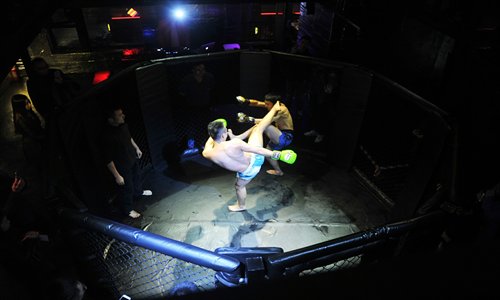HOME >> CHINA
Underground boxing brings risks due to lack of regulation
By West China City Daily - Global Times Source:Global Times Published: 2016-2-21 20:53:01

Two boxers fight in a boxing ring in a residential community in Chengdu, Sichuan Province on December 11, 2015. Photo: Lei Yuandong/IC
The posters outside the bar read "Come on! Have a fight and release yourself!" Inside the sparsely-decorated pub sits an around 10-square-meter cage.Nearly 50 boxing matches have been held in this underground boxing ring in Chengdu, Southwest China's Sichuan Province since it opened in November.
Not all the boxers are professionals. Lawyers, students and cab drivers, aged from 16 to 40, come here on weekends and fight each other in the dim ring amid the audience's loud cheers.
The bar organizes two or three matches each Friday and Saturday night and tickets are around 120 yuan ($18).
The bouts are governed by either boxing or mixed martial arts rules, but are more flexible than in professional, regulated fights.
Bloodshed
Before getting into the ring, boxers tape up their hands, especially their knuckles, said Yang Yiguo, a semi-professional boxer and one of the bar's investors.
The tapes protect the boxers and help them hit their opponent harder, said Yang.
Boxers oil their bodies so their opponents cannot grip them easily when they grapple with each other.
One boxer was knocked out in the first round because he was not oiled properly, said Yang.
Audiences expect to see brutal competitions. A match without bloodshed is seen as "less professional" and "less exciting."
A spectator named Yuan Yuan regularly uploads fight footage to social media, showing the fighters elbowing, punching and kicking each other. She wrote that "the matches are intense now."
Recent university graduate Yang Lu participated in a match in December and injured his lips.
He and another amateur boxer were told not to use their elbows or kick each other. The first round was a tie and in the second round, after Yang Lu punched the opponent in his stomach, the opponent held Yang's head and kicked it.
"I was shocked by his sudden attack and found my nose was bleeding and my gloves were covered with blood. The opponent kept provoking me and asked the referee to allow kicking but I refused," said Yang.
The situation was emotional with the boxers' friends yelling and the referee and bar staff had to mediate to reduce the tension.
There is little organizers can do to stop these incidents as they allow amateurs to simply turn up on match days and participate in unplanned fights without giving any advance notice, with little work being done to figure out their prowess, let alone getting fighters to sign a liability waiver ahead of time to protect the organizers from being sued. "Encouraging amateurs to fight could increase participation. But it is not enough to make the matches interesting," said Yang.
Concealing identity
The bar has organized 35 bouts, with 10 fighters giving their profession as "gym coaches" or "professional boxers," six as "drivers" or "freelance workers" and 19 registering as "students."
According to the pub's fighting rules, fighting boxers in prearranged bouts need to sign up in advance and the organizer will arrange the match according to their ability.
A boxer, Song Dongxuan who signed up for a contest as a "student," was later found to be a professional boxer.
Some people who sign up as "freelance workers" may be bodyguards and they are really semi-professionals, said Yang.
When semi-professionals fight amateurs, the difference in ability can easily be seen in the speed and force of their strikes.
Yang once knocked out an amateur fighter, who had won several fights previously, in three seconds.
While at first, the bar offered just 500 yuan to victors, they have now organized a tournament which starts with four group stages. The tournament champion will win 57,800 yuan.
Group stage winners will get 5,000 yuan and this is enough to attract some semi-professionals to participate, said Yang. "A fighter from Thailand will fly to attend the match and he is not the only overseas competitor," said Yang.
Other amateurs who choose to fight may do so simply to relieve stress and have a good time, said Yang.
At the end of each match, Xiao Mo (pseudonym), a lawyer in his 20s, is drenched in sweat, can barely speak and needs his friends' assistance to get out of the ring.
"We don't think it is dangerous. It looks interesting and he just wants to try it," said Mo's wife, who attends his every fight.
"I like wrestling, and I am interested in boxing and Muay Thai," said a lawyer who goes by the nom de guerre of "1942."
It is understandable that some people are tempted to watch or even participate in this passionate sport to release their stress but it is difficult to regulate the contests as there are no specific laws on it, wrote a commentary on West China City Daily. Government departments should to lead investigations into underground boxing matches to avoid the growth of illegal activities, especially gambling, read the article.
Newspaper headline: Bar brawlers
Posted in: Society